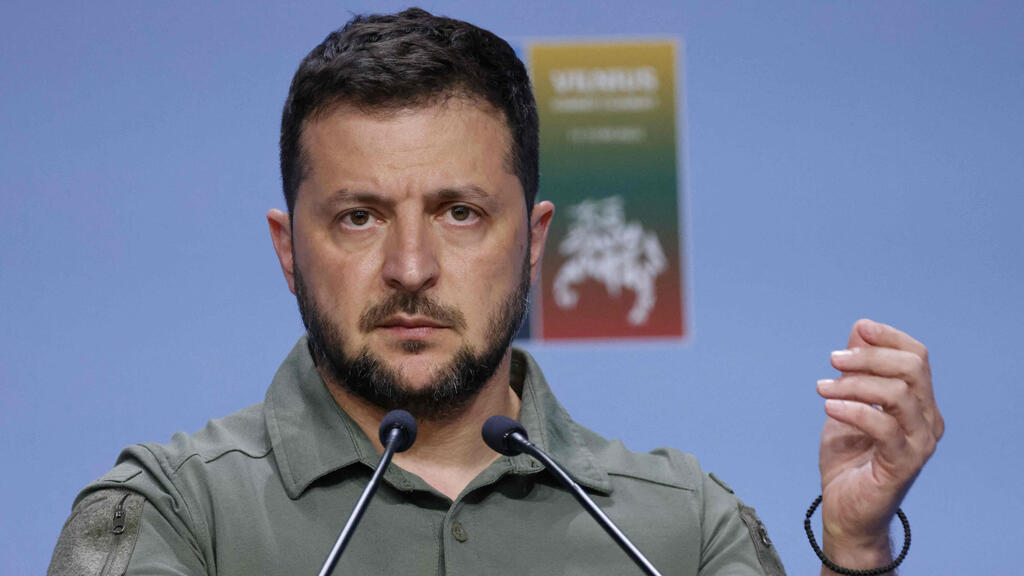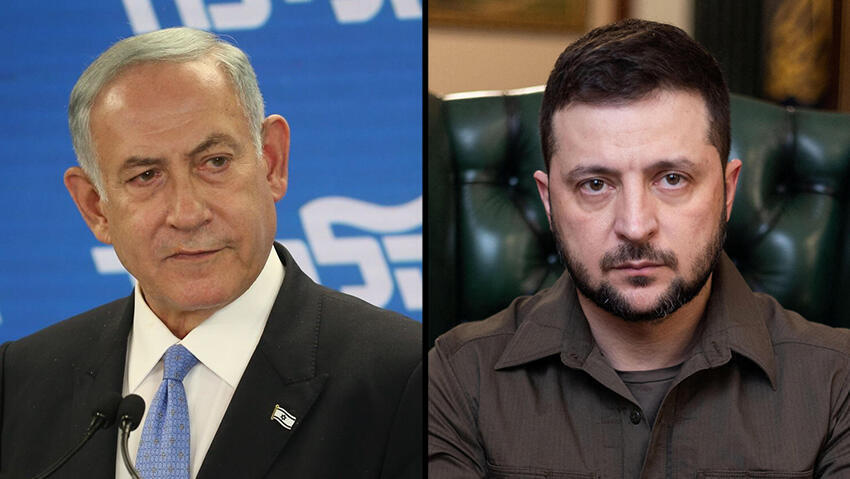Getting your Trinity Audio player ready...
The government of Ukraine has called on Israel to stop turning away Ukrainian refugees. If this does not stop, Ukraine will not allow Israeli pilgrims travel to Uman for the upcoming High Holiday season and will terminate its visa waiver agreement with Israel, according to Ukrainian officials.
More stories:
The message was delivered in President Volodymyr Zelensky's most recent address to his nation and by the Ukrainian ambassador to Israel.
3 View gallery


Ukrainian President Volodymyr Zelensky delivered a astern Message to Israel over its treatment of Ukrainian refugees
(Photo: LUDOVIC MARIN / AFP)
Zelensky in a stern message to Israel as part of his weekly briefing to the citizens of Ukraine: "I listened to the reports of the Border Guard, the Foreign Ministry, the intelligence on the treatment of our citizens – refugees who are in different countries, and regarding visa arrangements. The issues that the citizens of Ukraine actually face in obtaining visas. The rights of Ukrainian citizens must be guaranteed."
Ukraine's ambassador to Israel Yevgen Korniychuk clarified that President Zelensky's words were directed at Israel: "The government of Ukraine will not tolerate humiliation of its citizens upon entering Israel. We will stop our bilateral visa waiver agreements as stipulated in Article 7 of the intergovernmental agreement. This possibility is on the table of our government," he said.
"It is unthinkable that we would have to go out of our way to host tens of thousands of Israelis in Uman, with a high security risk, and with a huge logistical effort, when on the other hand the Israeli government mistreats our citizens who come to Israel as part of the treaty between our two countries. If Israel wants its citizens to be able to come to Ukraine as tourists, I believe that Prime Minister Benjamin Netanyahu, should intervene, personally, in finding a solution to the current state of affairs," he said.
3 View gallery


Ukrainian officials believe that Prime Minister Benjamin Netanyahu should get involved personally
(Photo: Shaul Golan/Reuters)
According to data from the Embassy of Ukraine, in 2022 Israel deported 2,705 Ukrainian citizens. In the first half of 2023, Israel deported 2,037 Ukrainian citizens - almost as much as in the entire year of 2022. The Ukrainians whose entry is banned sleep on the floor at night in the airport and then they are put on a plane back.
The Population Authority said that the Ukrainians' figures are inaccurate, and that most of the Ukrainians who arrived in Israel this year did receive an entry permit. According to the data, only 5.4% were refused entry and all the refusals were justified, because they came to work illegally. In total, since the beginning of the year, the entry of a little more than 2,000 Ukrainians was not approved, while 47,000 others did enter Israel
Interior Minister Moshe Arbel said in response to Korniychuk 's words: "I completely reject the claims about the humiliation of Ukrainian citizens upon entering Israel. Israel's immigration policy welcomes tourists from many countries in the world, including Ukraine. In cases where there is suspicion of illegal use of a tourist visa for the purposes of work or resettlement, the Population and Immigration Authority exercises its authority legally. The courageous partnership between Israel and Ukraine will continue."
Last week, Korniychuk said that "Israel deports 10% of all Ukrainians who arrive at Ben Gurion Airport. They are forced to go through humiliating procedures." In an interview with the Ukrainian news site News League, Korniychuk stated that Israel deports Ukrainian citizens even in cases where they have round-trip plane tickets, a booked hotel and money.
3 View gallery


Ukraine's ambassador to Israel Yevgen Korniychuk
(Photo: Embassy of Ukraine in Israel)
A few weeks ago in Kyiv, news outlets reported that Ukraine is considering canceling the visa exemption for Israeli citizens who come to its territory in order to prevent the Hasidic pilgrims from coming to Uman on Rosh Hashanah and also as a "reciprocal measure" for Israel's attitude toward the Ukrainian authorities. However, in Israel at the time it was believed to be an idle threat.
In June 2022, Korniychuk said in an interview in Ukraine that Kyiv is considering temporarily suspending the visa exemption for Israelis - in response, according to him, to the "unjustified restrictions imposed by Israel on the entry of Ukrainian citizens into its territory." Then Korniychuk: "Maybe now it won't be felt, but before Rosh Hashanah the Israeli government will feel it."
A week and a half ago, Ynet revealed that approximately 14,000 refugees from Ukraine who arrived in Israel since the outbreak of the war - are no longer eligible to receive health services because their medical insurance has expired, and the Ministry of Finance has not extended its validity. Following the disclosure, it was decided to extend the medical insurance for refugees from Ukraine, but only until the end of the year.
First published: 09:53, 08.20.23


